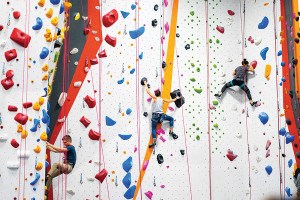Hey Kid, Put the iPhone Down
If you’ve gotten in the habit of handing your toddler your iPhone when she’s fussing in the stroller, you might want to rethink it—and not just because iPhones are freaking expensive. (I wouldn’t even let my kids hold my … well, there wasn’t anything analogous 20 years ago, was there?) While the American Academy of Pediatrics’ recent reminder that children under age two shouldn’t be exposed to screens applies only to TVs, that’s only because there isn’t yet sufficient scientific evidence that iPhones and iPads are bad for kids. There are, however, lots of experts to say they are.
But wait, you say—the iPhone is such a wonderful distraction for your baby! ’Zactly, says Gwenn Schurgin O’Keeffe, of the AAP’s council of communications and media. She told the New York Times the conclusion of the council when it comes to such devices: “At the moment, we seem to feel it’s the same as TV.”
Temple University psych prof Kathy Hirsh-Pasek, who specializes in how kids acquire language as well as in how play aids learning, says kids need “active engagement” to learn best, and that poking at a screen doesn’t count. Last year, she organized “the Ultimate Block Party” in New York City’s Central Park, dumping a fieldful of boxes and junk on the grass there and inviting kids to play with it. (She’s also written a book called Einstein Never Used Flash Cards, so you can sort of tell where she stands.) Hirsh-Pasek says our over-reliance on gadgets can lead to kids with fewer executive function skills—less ability to focus, shorter attention spans, lousy memories.
Every action has an equal and opposite reaction. The rush to improve the test scores of America’s kids led to endless drilling, with a concurrent loss of recess and time for free play. Now, since No Child Left Behind doesn’t much seem to be working, we’re leaning back the other way. Education Secretary Arne Duncan has promised to create waiver options so that 82 percent of all American schools won’t fail the Annual Yearly Progress test, as he’s projected they will.
That may not seem to have much to do with the iPhone you give Annabelle when she’s fussing in the Rite-Aid line. You’re just buying a little peace and quiet—for everybody—right? Here’s how Deborah J. Leong, a psych professor emerita at Metropolitan State College of Denver, described the roots of the vicious “drill and kill” loop we’re stuck in to the Chronicle of Higher Education: “We drill more because they can’t pay attention, but they can’t pay attention because they don’t have these underlying play skills, so we drill more. It’s pathetic.” In light of this recent study about SpongeBob obliterating kids’ executive functioning, that peace and quiet may not turn out to be worth the price.


